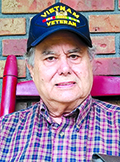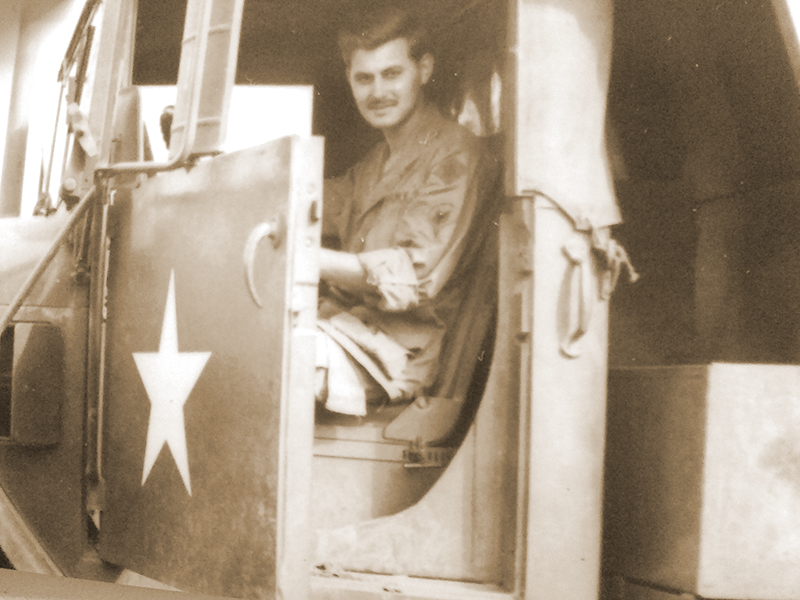Gilmer native Danny Puckett a Vietnam vet

After graduating Gilmer High School in 1967, Danny Puckett knew if he didn’t immediately enlist in the military he’d be drafted and likely go to Vietnam. He waited for the draft because of its minimal two-year requirement, and quickly learned U.S. fighting forces also had a humanitarian mission in the Southeast Asian country.
“One night we got a call to build a rope bridge because a Montagnard leader was very sick,” he said by phone last week. “We took him across and got him into a field hospital, where he got an operation for appendicitis. Things like that built a lot of good will among the Montagnards (indigenous people trained by U.S. Special Forces as allies). The idea of our military at that time was to try and turn things over to the Vietnamese, and in this case, the Montagnards.”
Puckett, who will turn 73 in December, grew up in the Pleasant Grove community and attended grammar school there. It was a two-room schoolhouse with students in one room, and storage for logs for the woodstove and lunch pails on the other side. His older brother, Eddie, was in Vietnam before him and told Danny he better get in shape for boot camp.
“I got me a pack, put some weight in it and ran up and down hills on the farm to help build my strength, and I did some things to toughen my hands like busting up firewood,” Puckett said. “I was sent to the Sand Hill section of Fort Benning for boot camp in July of 1968, and was met down there by about a dozen drill instructors. They had their way of running the military, so everywhere we went we were running or crawling. They made us feel right at home.”
He shipped out to Fort Ord, Calif., for advanced infantry training. After coming home to Ellijay for a short leave period, Puckett arrived in Vietnam just before Christmas. Initially, he had an Infantry MOS (military occupational specialty), but was assigned to support the 18th Combat Engineer Brigade. Eventually, he volunteered to become an engineer through on-the-job training.
At first, he helped build bridges and underground bunkers, then as part of ‘A’ Company went to An Lac, where a Special Forces camp was set up around a dozen miles from the Cambodian border near the Ho Chi Minh Trail.
“There’d been an airfield built there some time before I got there, and of course it had been attacked. My unit was assigned to rebuild it, and we stayed there permanently with the Special Forces. The airfield looked exactly like the one that was in the movie, The Green Berets, that John Wayne was in. I looked for John Wayne, but never did see him,” he joked.
Engineer work included constructing emplacements for other units.
“If our artillery people needed a place to set up, we’d go out on a hill, rappel down from a helicopter and start clearing the top of a mountain using C-4 (plastic) explosives to blow down trees,” said Puckett, who rose to the rank of corporal. “We’d come in with air-mobile dozers and front-end loaders (for clearing). We’d start in the early morning and before dark we’d have an artillery pad set up.”
Sacrifices by others
There were combat situations, as well.
“Sometimes they (the enemy) would try to crawl toward our position, and a lot of times they would be totally naked and dragging a satchel charge (of explosives),” Puckett said. “If they got close enough, they would throw that charge in your bunker. One night we had a guy coming up the road in a ditch dragging a satchel charge, and we kept trying to kill him. But what they would commonly do was get hopped up by smoking liquid opium with marijuana, and they’d be so high they didn’t feel any pain. We literally had to shoot the guy all to pieces — somebody finally shot his hand off.
“He was high on that stuff, and we didn’t think we were going to kill him before he got close enough to throw that satchel charge, but we did.”
What thoughts come to mind as Veterans Day approaches each year?
“My family had one brother in World War II (Charley), and the brother next to me (Eddie) was in Vietnam and received a Purple Heart,” he replied. “I was there later, and I always told him if I was a little slower and tried a little harder I coulda got a Purple Heart! And he said, ‘I didn’t try at all and I got one.’
“But we grew up like most people in Gilmer County, with a real strong sense of patriotism. We felt like if you were called upon to serve, it was your duty to serve. We just never did question that.”
Puckett also has powerful memories about America’s other military holiday.
“When it comes to Memorial Day, of course, I always think back to my friends that I knew from Ellijay and a lot of other places that died in Vietnam,” he began. “I knew all of them from Ellijay that were written about in the Times-Courier (earlier this year) that were killed in action, some better than others. Larry Davis graduated with me in 1967, but I went to Vietnam a little earlier than him. When I came back, I was stationed at Fort Benning, and Larry was going to NCO (noncommissioned officer) School there.
“Larry was a great guy, just a pleasure to be around. Some of us were pretty rambunctious, but Larry never got into the scrapes some of us got into in high school. I saw him at Fort Benning right before he left (for Vietnam). I got out in July of 1970, and he got killed over there about two months later.”
Puckett said there were other sacrifices, and not just by veterans.
“There were also sacrifices by the people that stayed home and had to take up slack on the family farm and those kinds of things,” he noted. “Another thing I think about is all the family members that are left behind when their loved one dies in military service. There’s a mother and father, brothers and sisters, possibly a wife and children — they live with that loss for the balance of their lives. That’s always what I think about, the sacrifice — of those who died, and those who were wounded horrifically and lost limbs and live in wheelchairs — and how they’ve had to adapt and overcome, and yet they are still able to function.
“But the loss to those families you just really can’t calculate, and some that return can have mental problems when they’re overwhelmed by the experience.”
More than 58,000 American men, and some women, died in Vietnam during the war. Puckett was asked if he ever thought about why he came home when so many others did not.
“That’s something we’ve all thought about,” he said of combat veterans. “I’m a Christian, and I have a lot of faith. But we’ll never understand why some people go, like myself, and never get injured and make it just fine, and others go over and it’s not willed for them to come home.”
Puckett, who now lives in Blue Ridge with his wife, Glenda, worked at Robertshaw Controls in Ellijay before the plant relocated, then was employed by the Georgia Secretary of State’s office and stayed on under five directors. Glenda also worked for the same office.
For fellow Vietnam veterans, Puckett’s unit within the 18th CEB was the 35th Group, Company C, 70th Combat Engineer Battalion.

